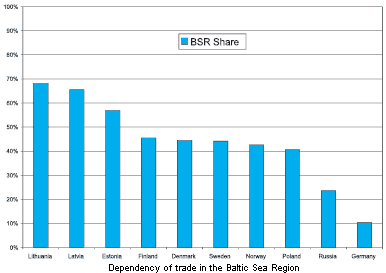Enlargement and Implications for Growth
During the last decade a tremendous transformation
and economic development has been observed in Poland, Russsia
and the Baltic States. The EU accession process has been
vital in the fast transition to market economy in the new
member states.

Fastest growing economy
Over the past few years, the Baltic Sea region has been
one of the fastest growing regions in the world. In the
last decade the trade in the Baltic Sea region has boomed.
Swedish trade with transition economies has quadrupled from
the initial levels in the early 1990s. However, exports
to Baltic States, Poland and Russia are relatively smaller
than to Nordic countries.
Keeping growth going will require substantial
investment. The capital stock needs to be upgraded before
firms will be able to compete with developed countries.
The income gap in opposition to EU member states is large
with GDP per capita, therefore there is still plenty of
room for these economies to grow. Labour productivity has
been growing at a good pace of 4 percent in the Baltic States
and 3 percent in Poland. Only productivity growth in Russia
has been barely positive.
The supply of capital domestically for investment
is limited due to countries suffering from large account
deficits. Foreign Direct Investment (FDI) has boosted through
Economic Zone arrangments but since these will no longer
be allowed it is vital to keep the FDI on a high level.
EU will not better public finances
The structural funds are supposed to be matched with national
public investment and this type of government spending may
crowd out private investments, which leads to budgetary
strain. New research indicates that the past 20 years of
structural funds have had little if any impact on regional
economic convergence. Therefore massive structural funds
do not necessarily lead to sustained growth but sometimes
just the opposite.
Reforms must continue
The domestic issues such as administrative barriers, corruption
and the financial market are the most serious threat to
economic growth and prosperity. There are several problems
that must be sloved and instruments that should function.
Financial systems need to be further developed.
There are still high spreads between lending and borrowing
rates. Banking and finance in the accession countries is
dominated by foreign players, which brought muscle and business
knowledge but has not yet transformed into SME lending and
financial integration
Growth of small firms must increase. Small
and medium sized enterprises (SME) are not growing enough.
There are difficulties in getting short and long-term loans
so there exists a strong need to rely on internal funds.
Poor support from state agencies is yet another problem
especially in Russia, where the state rather tends to focus
on most tax- profitable sectors such as fuels.
Institutional reform has slowed. The accession
countries still lag behind the UE criteria such as rule
of law, corruption, government effectiveness. So it is vital
not to let the reforms weaken after the accession to UE.
The level of institutional reform varies although Estonia
is starting to approach OECD levels.
Baltic Sea Region bridges Russia to the
West
Russian trade potential is huge. There is a commonly held
view that the Baltic Sea region will be a "bridge to
the west" but the evidence show it may appear just
the opposite.
A general problem lay in the ability of implementation
of the reforms. Russia suffers from an undeveloped SME sector,
weaker domestic support for continues reforms. May lack
of encouragement such as the UE membership was for the Baltic
States and Poland may impede these processes in Russia?
Joining the WTO would decrease russian ability to bureaucracy
and would provide positive measures such as clear customs
procedures, intellectual rights protection or less discrimination
of foreign own companies. However the possible joining the
WTO or formation of Common European Economic Space looks
distant.
In recent years, exports from Russia to the
Baltic Sea region have been growing more than imports which
makes Russia a net exporter. Also an n increase of russian
foreign investments in the EU and U.S. was noticed.
After the EU expansion eastwards a renewed
debate about Russia's relations with Europe is expected.
FDI in East not detrimental for West
There is little evidence that the parent companies making
investments in low cost countries cause reduction of employment
in their home country. Research suggests that outward FDI
may have a positive effect in this matter. Negative effects
should be offset by positive ones such as vertical specialisation.
For example, manufacturing industry in Poland or transport
and communication of petrochemicals in Russia.
Getting the most out of enlargement.
The primary benefit of EU membership is removing trade barriers
and reducing transaction costs. EU membership has still
the capacity to encourage foreign investment. There is still
room for substantial growth in investment and trade, but
further improvements must come in the investment climate
throughout the region and a new strategy must be found for
cooperation with Russia.
Source: "EU Enlargement. Implications
for trade, growth and investment in the Baltic Sea Region"
- a report by the Stockholm Institute of Transition Economics
(SITE)
The report is available at: www.hhs.se.
|